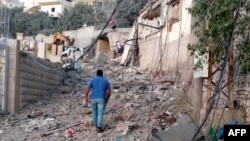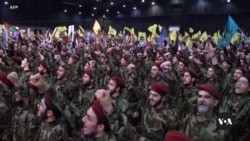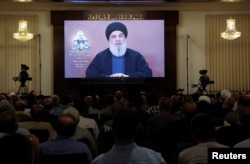U.N. Secretary-General Antonio Guterres warned Friday that a single miscalculation or reckless move could plunge Israel and Lebanon’s Hezbollah into a catastrophic war, and he urged both sides to pull back from the brink.
“Let’s be clear: The people of the region and the people of the world cannot afford Lebanon to become another Gaza,” Guterres told reporters at the United Nations.
The threat of a wider war on Israel’s northern border has intensified in recent weeks, with more exchanges of fire across the U.N.-monitored Blue Line between Israel and Lebanon. Israeli officials and Hezbollah’s leader have raised the temperature with heated rhetoric.
“The world must say loudly and clearly: Immediate de-escalation is not only possible — it is essential,” Guterres said. “There is no military solution.”
He said a further escalation would cause only more suffering and devastation for communities on both sides of the border “and more potentially catastrophic consequences for the region.”
Communities in northern Israel and southern Lebanon evacuated months ago, after Hamas’ October 7 terror attack inside Israel set off the war in Gaza. Hezbollah has fired barrages of rockets from its positions into northern Israel in support of its ally, Hamas.
About 100,000 people have been displaced on each side of the border. The Lebanese Ministry of Health said Friday that 432 people have been killed in exchanges of fire. That figure includes at least 60 militants, according to local press reports. In Israel, 16 soldiers and 11 civilians have been killed in the fighting.
The United Nations has a peacekeeping force of just over 10,000 troops from 49 countries along the Blue Line. Asked about their situation should a war break out, Guterres said there are contingency plans and procedures in place to guarantee their safety, “including in the case of a total explosion.”
“But now our main concern is to make sure that we do not have a dramatic escalation that would be a disaster for the area and the world,” he said.
Washington seeks de-escalation
The U.N. chief’s warning comes as U.S. officials are trying to halt an escalation between Israel and the Iranian-backed Hezbollah fighters based in southern Lebanon.
That threat figured in talks Thursday in Washington, where U.S. Secretary of State Antony Blinken and White House National Security Adviser Jake Sullivan met with Israel’s national security adviser, Tzachi Hanegbi, and Strategic Affairs Minister Ron Dermer.
They also discussed efforts to reach a Gaza cease-fire, secure the release of all remaining hostages and increase humanitarian aid for Palestinian civilians.
“We've been extremely concerned about the situation in the north of Israel,” State Department spokesperson Matthew Miller told reporters Thursday.
“We have seen a dramatic increase in strikes by Hezbollah across the border targeting Israeli villages, civilian infrastructure. And so, we have been pursuing a diplomatic resolution to try to make clear that there should be no further escalation.”
The talks in Washington follow White House senior adviser Amos Hochstein’s meetings earlier this week in Israel and Beirut, where he said a Gaza cease-fire could bring the Israel-Hezbollah conflict to an end.
Rising rhetoric
Hezbollah leader Hassan Nasrallah warned Wednesday that no place would be safe in Israel if a war erupted between the country and the Lebanese militant group.
Nasrallah said in a televised address that Iran-backed Hezbollah has a "bank of targets" that would be subject to precision strikes if the sporadic fighting between the two foes turned into a broader conflict.
"There will be no place safe from our missiles and our drones" in Israel, Nasrallah said.
On Tuesday, Hezbollah released what it said was drone footage of sensitive sites deep within Israel.
"We now have new weapons," Nasrallah said Wednesday. "But I won't say what they are. ... The enemy knows well that we have prepared ourselves for the worst ... and that no place ... will be spared our rockets."
On Friday, Iran’s mission to the United Nations posted a warning on social media platform X directed at Israel. It said Israel should not plunge the region into a new war, warning that Hezbollah has the capability to defend itself and hinting a war with Hezbollah could lead to Israel destroying itself.
Israel is aware of Hezbollah's weapons, Lieutenant General Herzi Halevi, chief of staff of the Israel Defense Forces, said Wednesday during a trip near Israel's border with Lebanon.
"The enemy only knows a small part of our capabilities, and will see them at the needed time," he said.
Cyprus threatened
In his broadcast, Nasrallah threatened Cyprus, accusing it of opening "Cypriot airports and bases for the Israeli enemy to target Lebanon." That move, he said, "means that the Cypriot government has become part of the war, and the resistance will deal with it as part of the war."
Cypriot President Nikos Christodoulides responded by saying his nation "is in no way involved" in any military operation.
Cyprus, a European Union member, is also a former British colony. Britain has maintained sovereign control of two bases on the island.
VOA’s Fern Robinson contributed to this report. Some information for this story was provided by The Associated Press and Reuters.








